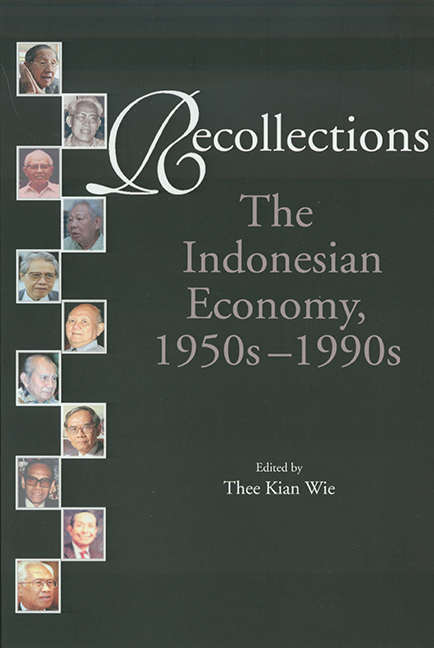Foreword
Published online by Cambridge University Press: 21 October 2015
Summary
As Dr Thee makes clear in his preface, the idea of publishing a series of memoir-style articles, based on extended interviews with a number of Indonesians who have played an important role in influencing the evolution of Indonesia's economy, originated with Professor Anne Booth. She and my immediate predecessor, Professor Hal Hill, deserve great credit for having published these articles over a period of some 14 years.
The Surveys of Recent Developments that have appeared in every issue of the Bulletin of Indonesian Economic Studies since its inception in 1965 provide a unique contemporaneous account of Indonesia's economic development during this period. The Recollections articles nicely complement the Surveys with a series of insider views of this process, as related by some of the individuals who were influential in driving it.
As well as bringing all these articles together in a single volume, Dr Thee has provided an introductory overview of Indonesia's economy in the post-colonial period that enables readers to understand the context in which the individuals concerned were operating. The volume as a whole will thus help students of Indonesia to understand the ideas and political realities that shaped policies of the day. In addition it contains useful lessons for policy-makers and others who would influence policy-making — if they care to look hard enough. My impression is that too much policy-making proceeds by trial and error rather than on the basis of careful analysis and design — and, worse, that trials and errors of the past are too often forgotten. As the saying goes: those who fail to learn from history are destined to repeat it.
Dr Thee's introductory chapter gives considerable attention to the “economic technocrats”, several of whom are represented here. Perhaps the most important lesson the technocrats learned from the Sukarno period was that little progress is possible — indeed, that disaster awaits — if macroeconomic policy fails to provide reasonable monetary and price stability. They were able to go close to achieving this by adopting the simple rule that budgets should be balanced — or more precisely, that budget deficits should not be financed by money creation.
- Type
- Chapter
- Information
- RecollectionsThe Indonesian Economy, 1950s–1990s, pp. ix - xiiPublisher: ISEAS–Yusof Ishak InstitutePrint publication year: 2003

